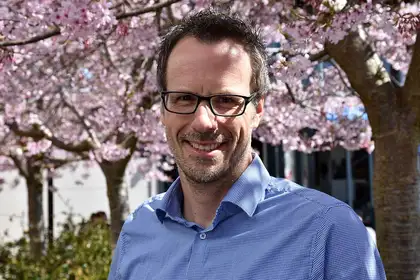
Professor Folker Hanusch is in New Zealand conducting interviews with Māori journalists.
Professor Folker Hanusch is a German researcher with surprising expertise. The University of Vienna journalism professor studies the way culture influences journalism, including Māori journalism in Aotearoa.
He’s currently in the country doing field research for a new book and is speaking to Māori journalists at a range of media organisations, as well as Māori bloggers and freelancers. His visit will end with a public research seminar on Māori journalism culture at Massey University’s Wellington campus on October 4.
“Much has happened since I last visited seven years ago, so I want to take account of those changes,” Professor Hanusch says. “I’m asking participants about their motivations for becoming journalists, what they want to achieve with their work and the role cultural values play.”
He says the impact of culture on journalism is under-researched globally, even though it is important to understand why and how journalists do the work they do.
“I think looking at cultures other than one’s own often makes these influences more apparent, because we tend to take our own cultures for granted and rarely identify how they influence us,” Professor Hanusch says.
“The little research that exists has tended to look at how values such as collectivism influence journalism – such as in Asian countries, where the group is more important, as opposed to the more individual cultures in the West.”
Combatting stereotypes and revitalising the language
He says Māori journalism has been an excellent case study for exploring the impact of other cultural influences, including the need to present a counter-narrative to negative stereotyping of minority cultures.
“There has always been an activist component to Māori journalism to try to counter the negative images, but also to take ownership of Māori stories and, in a way, empower Māori society in Aotearoa. It provides a Māori view on issues that’s a different perspective from that of Pākehā.”
Professor Hanusch says Māori journalism sometimes has different news values and the cultural values of journalists more clearly shape the story.
“Tikanga Māori is important, many journalists speak of a different kind of respect they show to sources, it’s less confrontational than traditional, Western journalism. There is a duty of care for those they interview, and for the knowledge they gain from them.”
He says te reo media have the additional mission of revitalising the language and journalists put a lot of thought into how stories are told. Many feel they have more “poetic licence”, he says, when telling stories in te reo Māori.
“At the same time, the universal journalistic role of wanting to speak truth to power is also present in Māori journalists’ narratives about their work,” Professor Hanusch says. “And obviously that can sometimes lead to conflict with the desire to provide a counter-narrative to the negativity about Māori in mainstream media, so there are some interesting tensions.”
Public research seminar details
Exploring the role of cultural values in the news: A case study of Māori journalism
When: Thursday October 4 at 4pm
Where: Room 12B09, The Pit, Massey University Wellington Campus
Professor Hanusch will talk about the impact of cultural influences on Māori journalism. Based on extensive interviews with Māori journalists in 2011 and 2018, the presentation will trace cultural values in Māori news work and explore the tensions that can arise within such an environment.
Professor Hanusch will then be joined by Massey lecturer and Māori academic Dr Steve Elers and Radio New Zealand journalist Leigh-Marama McLachlan for a panel discussion.